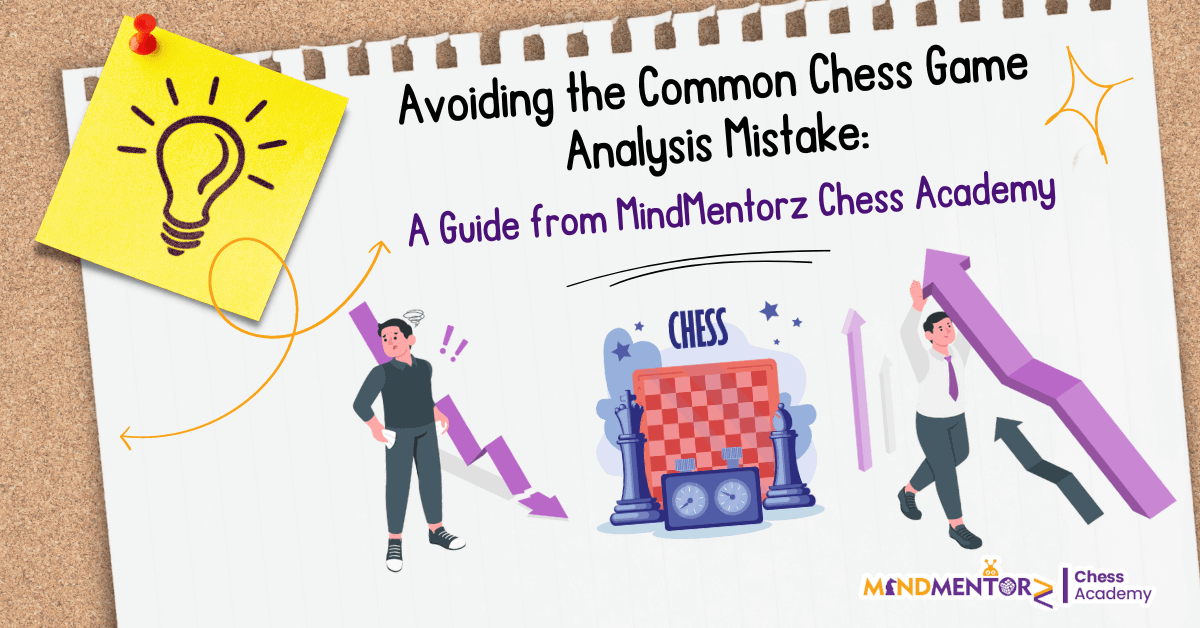
Introduction: Common Game Analysis Pitfalls
As we all know, analyzing chess games is crucial for improvement. However, many players fall into the trap of overly relying on chess engines, often overlooking the most critical aspects of self-analysis. At MindMentorz Chess Academy, we encourage students to adopt a more insightful approach that not only identifies mistakes but also improves decision-making processes. A common mistake we see is asking the wrong questions during analysis. Let’s dive into how you can elevate your game analysis and avoid this error.
The Problem with Engine-Only Analysis
Most chess players, after finishing their games, turn on an engine and check for mistakes. While this shows what went wrong, it only scratches the surface of what analysis should be. Merely seeing that the engine preferred a different move is not enough. It’s like getting an answer in school without understanding the steps behind it.
- What players often ask: “What would have been the better move?”
- What they should ask: “Why did I make this mistake?” and “How can I avoid it in future games?”
At MindMentorz, we emphasize teaching students to ask the right questions, as this significantly improves understanding and overall gameplay.
Focus on the “Why” to Strengthen Chess Understanding
Asking why another move is better enhances your understanding. It’s crucial not just to know that your move was wrong but why it was wrong. Here’s where deeper thought comes into play:
- Was the mistake tactical or positional?
- Did you miss your opponent’s counterplay?
For instance, one of our coaches recalls a game where he misjudged his attacking potential by playing 13…f5 instead of 13…Nxc3. Although the move looked aggressive, it weakened his position. Understanding such subtle positional aspects builds chess strength and helps you make better decisions in future games.
The Importance of Self-Reflection: Why Did You Make That Move?
Equally important is understanding why you chose a particular move during the game. Was it due to overconfidence, lack of calculation, or perhaps pressure from the clock? Identifying the root cause of your decisions can help prevent repeated mistakes. For example:
- Were you playing too fast, skipping important candidate moves?
- Were you too optimistic or distracted by an earlier blunder?
By reflecting on these questions, you become more conscious of your thought process during games. At MindMentorz, we encourage self-reflection to improve both discipline and critical thinking.
The “How” – Creating a Strategy for Improvement
Once you understand the why, the next step is asking yourself how you can fix this issue. Chess improvement comes not only from recognizing mistakes but also from developing strategies to avoid them in the future. A good practice could be:
- Reminding yourself to check for opponent’s threats before making a move.
- Slowing down your decision-making process in complex positions.
- Reading materials on positional chess if your errors are mainly positional.
At MindMentorz, we guide players through structured training routines, focusing on fixing individual weaknesses.
A Better Way to Analyze: Step-by-Step Process
To enhance your chess analysis, we recommend following a structured process:
- Review important moments: Write down critical points during the game and why you made each decision.
- Use the engine sparingly: Focus on big mistakes rather than checking every move.
- Understand why the engine’s suggestion is better: Don’t just copy; dig into the logic behind each move.
- Reflect on your mistakes: Think about why you made the wrong choice.
- Plan future improvements: Implement a strategy to avoid repeating those mistakes.
At MindMentorz Chess Academy, we personalize this process for our students, helping them analyze more efficiently and learn from each game.
How MindMentorz Helps You Improve
We believe in structured, mindful analysis at MindMentorz Chess Academy. Through guided sessions, we help you reflect on your mistakes and devise concrete plans for improvement. Whether it’s identifying a weak area in your decision-making or guiding you through positional or tactical blunders, we’re committed to building chess champions who think critically.
- Personalized coaching: Each player has unique strengths and weaknesses. Our coaches help you identify areas of improvement.
- Game review sessions: We guide students in analyzing their games with a deeper understanding of why and how.
- Strategy development: We help players create actionable plans to strengthen weak areas.
Conclusion: Focus on the Right Questions for Meaningful Improvement
In summary, meaningful chess improvement doesn’t come from asking what the best move was—it comes from understanding why a move was better and how to prevent mistakes in future games. At MindMentorz Chess Academy, we encourage players to focus on reflective and insightful game analysis, which leads to long-term improvement.
Next time you sit down to review your game, remember: the right questions will take your analysis—and your chess—to the next level.
